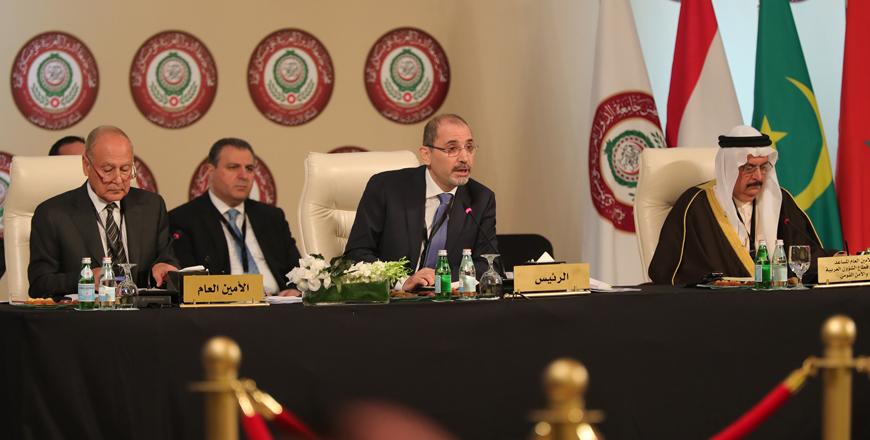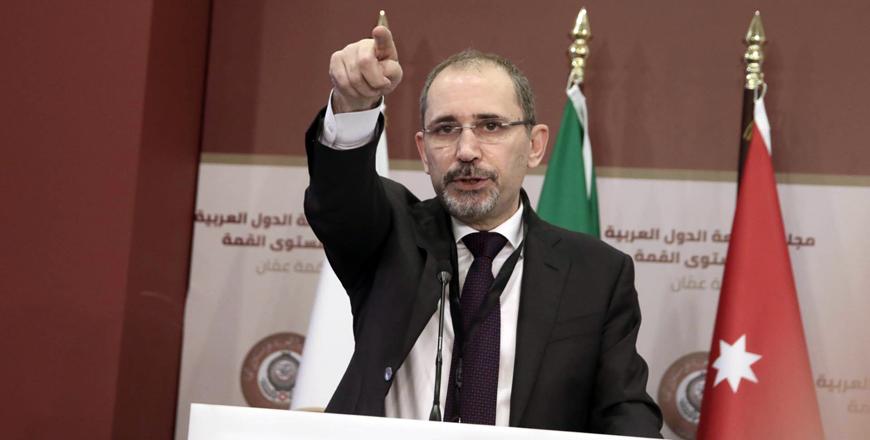You are here
United Arab stand, despite disagreements, crucial in tackling regional challenges — Safadi
By Dana Al Emam , Laila Azzeh - Mar 28,2017 - Last updated at Mar 28,2017

Foreign Minister Ayman Safadi addresses the foreign ministers’ preparatory meeting for the 28th Arab summit at the Dead Sea on Monday (Photo by Osama Aqarbeh)
DEAD SEA — The foreign ministers’ preparatory meeting for the 28th Arab summit opened on Monday amidst a regional outlook that requires Arab countries to extend further support to each other and to the Arab League’s budget.
Speaking at the opening of the session, where the presidency was handed over to Jordanian Foreign Minister Ayman Safadi from his Mauritanian counterpart Isselkou Ould Ahmed Izid Bih, Safadi highlighted Jordan’s stance towards a collective pan-Arab effort to overcome current regional challenges and to build a better future that provides a “decent and productive life” to Arabs.
He said the 28th Arab summit is taking place at a “difficult time” for the Arab nation, which lacks the necessary security and stability to address the needs of the Arab peoples in development, education, labour and hope.
Over the years, the regional Arab system has not been able to resolve regional issues, which has decreased the Arab people’s trust in the effectiveness of collective Arab work, he said, adding that the lagging performance of the regional system as a driving force for development has allowed external forces to intervene and exercise their power according to their agendas.
However, Safadi said Arabs today have the chance to retake the initiative and arrive at consensuses that can put Arab countries on the path to solving crises and overcoming challenges.
“It is true that there are differences in our visions and policies, but there are also points of agreement, interests and goals that bind us and make our agreement on coordinated stances a possible option,” he added.
The foreign minister said Arabs agree on the centrality of the Palestinian issue, and that ending the injustice practised against Palestinians through the realisation of the two-state solution is a basic requirement in order to achieve regional safety and stability.
In addition, he said Arabs agree on the need for a political solution to the Syrian crisis in light of Geneva I and UN Security Council Resolution 2254.
Also, Arab countries support the national reconciliation of all Iraqis that will deepen the collective national identity and support the legitimate governments of Yemen and Libya, the foreign minister said.
Safadi cited the fight against terrorism as another central point of agreement among Arabs, as they all agree on the necessity of “enlightened thought”.
He added that there are over 12 million Arab children of school age, who do not attend school, warning of the potentially dire consequences in the future if this is not addressed, while highlighting the need to develop opportunities for young people.
All these commonalities require Arabs to develop consensuses to create effective plans to bring hope and development to the Arab people, the minister said.
Meanwhile, in his opening remarks, Arab League Secretary General Ahmed Aboul Gheit conveyed a strong message to Arab states on the need to shore up the league’s “declining” budget.
“The Arab League budget has been suffering from a very critical deficit over the past two years. The league, which reflects the status of Arab unity and solidarity, cannot continue to fulfill its duties without being able to fund its operations,” Aboul Gheit underlined.
On the other hand, Aboul Gheit called for Arab countries to “take control” over one of the most dangerous crisis now, the refugee issue.
“We still have heartwarming evidence of Arab solidarity when we look at how millions of Arab refugees have sought refuge in Arab countries, which in return received them with the utmost care,” he said.
On the other hand, the secretary general warned that “leaving the issue of refugees in the hands of other countries to decide about it is not a wise thing to do, knowing that they will use the cause for their own interest”.
“We should support countries like Jordan and Lebanon, which are no longer able to overcome the repercussions of hosting refugees,” Aboul Gheit added.
He also cited the need for immediate Arab action towards the “huge” security threats the region is facing today, which he noted are unprecedented since the Israeli aggression in 1967.
“We are ready to work with any sincere side that is willing to work for the establishment of an independent Palestinian state with Jerusalem as its capital,” said Aboul Gheit.
Izid Bih, who headed the foreign ministers’ preparatory meeting for the 27th summit, said the current regional conditions entail further pan-Arab collaboration to address issues of the region.
Related Articles
DEAD SEA — Concerns over the regional situation and its impact on Arab people dominated Arab officials’ speeches at the opening session of M
AMMAN — His Majesty King Abdullah on Wednesday said Jordan would exert all necessary efforts to ensure the success of the Arab League’s 28th
AMMAN — Deputy Prime Minister and Foreign Minister Nasser Judeh on Tuesday said that under directives from His Majesty King Abdullah, the Ki

















